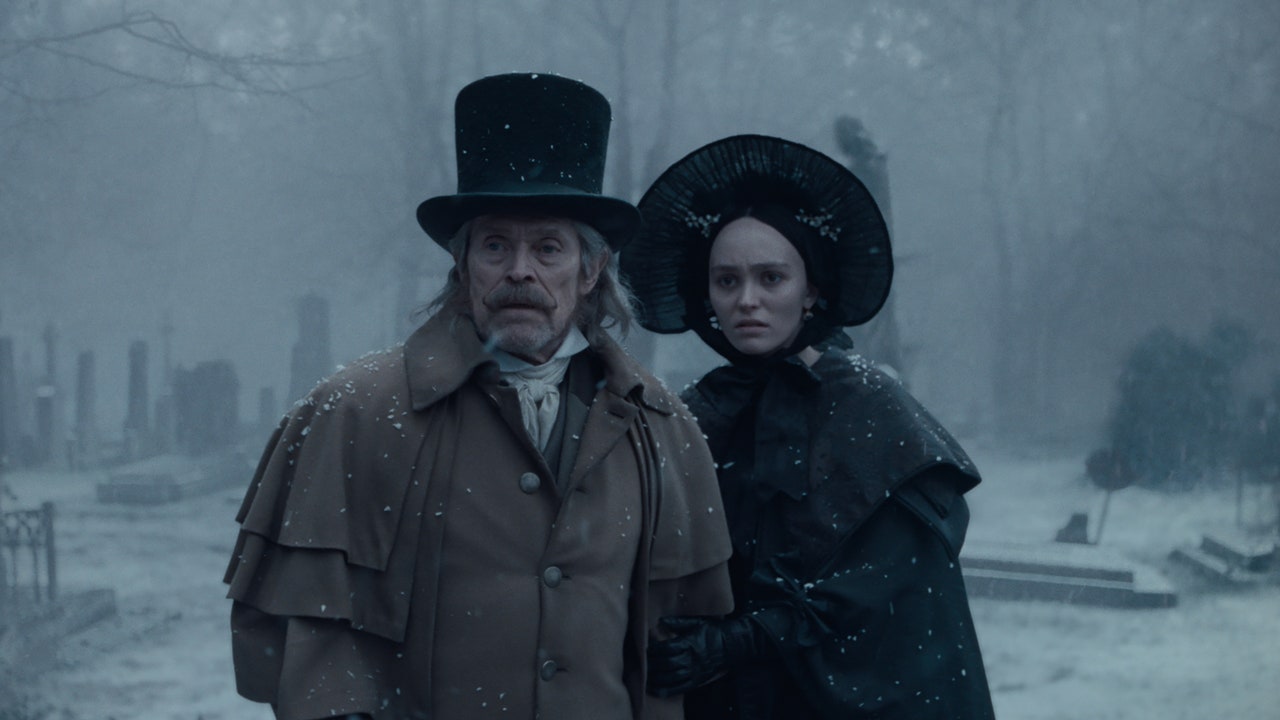
Several times in Robert Eggers’s new film Nosferatu (opening Christmas Day)—I daresay a few too many—an addled character looks skyward and ominously yells (or whispers) “He’s coming!” It happens often enough in this plodding film that eventually one wants to shout back to the screen, “Get there already!” Yet when the titular vampire based on Bram Stoker’s Dracula finally does arrive, all that build-up hardly proves worth it.
Which is a shame, as one wants a dark, stylish vampire movie to be a successful and clever bit of Christmas counterprogramming. That was presumably the hope of Focus Features, which sunk no small amount of money into this film and planned a wide release. But Robert Eggers is not a filmmaker focused on entertaining audiences above all else. He’s a maximalist, yes, but his version of maximal does not closely align with, say, Marvel’s. It’s alienating, it tries patience. Eggers’s previous film, The Northman, was his most commercial to date, full of blockbuster-y action sequences—but at root, the film just wanted to show us how miserable life probably was back in the old Viking days.
Thus we weren’t likely to get anything too fun or campy in an Eggers Nosferatu, a remake of a 1922 classic that has had a measurable impact on horror filmmaking for over a century now. What we certainly could expect is grand visuals and crashing music. Here, Nosferatu delivers. Jarin Blaschke’s cinematography pays homage to the Expressionism of the original, capturing Craig Lathrop’s ornate production design in stark, evocative tones. Robin Carolan’s score conjures up the dread of an ancient horror descending upon the unwitting.
Nosferatu is a sensory pleasure. But on a story level, it leaves much to be desired. Eggers follows the basic structure of the original film, and thus of Dracula. A young man, Thomas (Nicholas Hoult), working in real estate in 1800s Germany travels to the wintry, sinister Carpathian mountains to close a deal with a reclusive nobleman, Count Orlok (Bill Skarsgård, swiftly becoming this generation’s Lon Chaney). Orlok is looking to move to Thomas’s hometown, which is not a good sign. The familiarity of this setup is fun: it’s a bit like watching an umpteenth take on A Christmas Carol and cozily settling into that reliable narrative structure, curious how this version will distinguish itself.
Eggers makes his mark by going hard on the psychosexual madness aspect of the story, for both Thomas and his fluttering young bride, Ellen (Lily-Rose Depp)—who is back home and suffering mightily from seizures and prophetic hallucinations. She’s experiencing some kind of mindmeld bond with Orlok, who is bound and determined to make his way to Ellen so that he can… well, so he can fuck her.
Most vampire stories are about sex to some extent, oftentimes serving as a vehicle for men to imagine what it might be like to be preyed upon by a libidinous ghoul, while also perhaps imagining themselves as said ghoul. Eggers’s Nosferatu is about the inevitability of just such a monstrous man, and the noble innocent beauty who offers herself to him to slake his ravenous hunger. It’s an odd bit of sexual and gender politics to be bandying about these days, but Eggers bandies away anyway.
This isn’t necessarily a problem on its face. But the cosmic, cross-continent push and pull between Ellen and Orlok grows dreadfully repetitive as the film stalls and stalls and stalls ahead of the main event. Poor Depp is made to writhe and moan for nearly the whole run of the film, rarely given any new level to play. Eggers tries to spice things up with grizzly old coots Simon McBurney (as the film’s Renfield figure) and Willem Dafoe (as an ersatz Van Helsing), but mostly we are stuck watching characters nervously attend to Ellen’s histrionic fits.
Eggers doesn’t do much with the other dependably fun part of the Stoker template: the investigation into and discovery of what Dracula/Orlok actually is. The film rushes through that exposition on the way to a big, uh, climax, killing a few people on the way. Nothing is particularly scary, because most of the movie’s humanity is drowned out by the relentless churn of Eggers’s visual and aural mood.
Dafoe at least seems to be enjoying himself, though there’s perhaps something too expected about his casting; I worry that too many directors these days only want him to do the ol’ Willem Dafoe drag rather than giving this great actor something genuinely juicy to play. Aaron Taylor-Johnson is a hoot as Thomas’s haughty friend Friedrich, putting on a silly posho accent and practically twirling his mustache in disdain. He is, sadly, but a dim light in an otherwise oppressive, overwrought slog. By the end, Nosferatu did at least sell me on Ellen’s motivation: I, too, was ready to surrender myself to a disgusting demon if it meant we could wrap things up.




